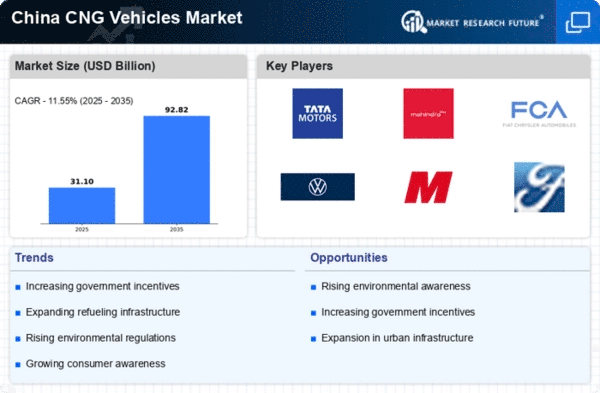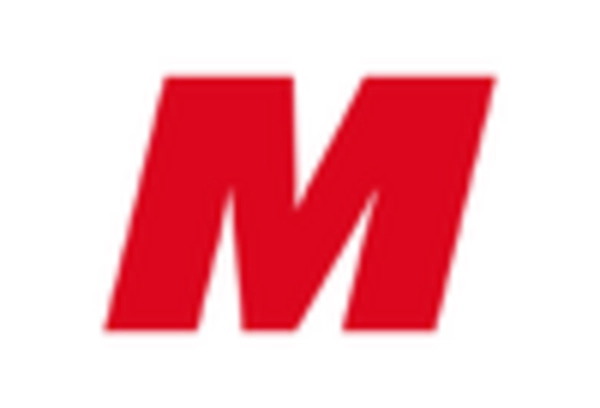Fleet Transition to CNG
The transition of commercial fleets to CNG significantly influences the CNG vehicles market in China.. Many logistics and transportation companies are recognizing the benefits of CNG vehicles, including lower fuel costs and reduced emissions. In 2025, it is estimated that approximately 25% of new commercial vehicles will be CNG-powered, driven by both regulatory pressures and economic incentives. This shift not only contributes to the reduction of urban air pollution but also aligns with corporate sustainability goals. As more companies adopt CNG vehicles for their fleets, the market is expected to experience substantial growth, potentially doubling the number of CNG vehicles on the road by 2030.
Economic Viability of CNG
The economic viability of CNG as a fuel source plays a crucial role in the cng vehicles market in China. With fluctuating oil prices, CNG has emerged as a cost-effective alternative, often priced significantly lower than gasoline or diesel. In 2025, the average price of CNG is approximately 30% lower than that of traditional fuels, making it an attractive option for consumers and fleet operators. This economic advantage is further enhanced by the lower maintenance costs associated with CNG vehicles. As more consumers and businesses recognize the financial benefits, the market for CNG vehicles is expected to expand, potentially increasing market penetration to 20% by 2030.
Environmental Regulations
The CNG vehicles market in China is significantly influenced by stringent environmental regulations. These regulations aim to reduce air pollution and greenhouse gas emissions.. The Chinese government has implemented various policies that promote the adoption of cleaner fuel alternatives, including compressed natural gas (CNG). As urban areas face increasing pollution levels, the demand for CNG vehicles is likely to rise. In 2025, the government aims to have CNG vehicles account for a larger share of the total vehicle fleet, potentially reaching 15% by 2030. This regulatory push not only encourages manufacturers to innovate but also incentivizes consumers to transition to CNG vehicles, thereby driving market growth.
Public Awareness and Education
Public awareness and education regarding the benefits of CNG vehicles are pivotal in shaping the cng vehicles market in China. As consumers become more informed about the environmental and economic advantages of CNG, their willingness to adopt this technology increases. Campaigns aimed at educating the public about the lower emissions and cost savings associated with CNG vehicles are gaining traction. In 2025, surveys indicate that over 60% of potential buyers express interest in CNG vehicles, reflecting a growing acceptance. This shift in consumer perception is likely to drive demand, encouraging manufacturers to invest in CNG technology and infrastructure, thereby fostering market growth.
Investment in CNG Infrastructure
Investment in CNG infrastructure is a critical driver for the cng vehicles market in China. The establishment of refueling stations and distribution networks is essential for the widespread adoption of CNG vehicles. In recent years, the government has allocated substantial funds to enhance CNG infrastructure, with plans to increase the number of refueling stations by 50% by 2027. This expansion not only facilitates easier access to CNG but also reassures consumers about the availability of fuel. As infrastructure improves, the convenience of using CNG vehicles is likely to attract more consumers, thereby propelling market growth and increasing the overall adoption rate.
















